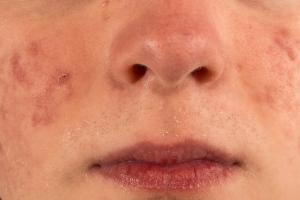Acne
Acne is a common skin condition that affects most people. It causes spots, oily skin and sometimes skin that's hot or painful to touch. Acne is very common in teenagers and younger adults.
Types of spots
Acne most commonly develops on the:
- face
- back
- chest

There are six main types of spot caused by acne.
Blackheads
Blackheads are small black or yellowish bumps that develop on the skin. They are not filled with dirt, but are black because the inner lining of the hair follicle produces pigmentation (colouring).
Whiteheads
Whiteheads have a similar appearance to blackheads, but may be firmer and won't empty when squeezed.
Papules
Papules are small red bumps that may feel tender or sore.
Pustules
Pustules are similar to papules, but have a white tip in the centre, caused by a build-up of pus.
Nodules
Nodules are large hard lumps that build up beneath the surface of the skin and can be painful.
Cysts
Cysts are the most severe type of spot caused by acne. They are large pus-filled lumps that look similar to boils and carry the greatest risk of causing permanent scarring.
Self-help tips if you have acne
If you have acne, the self-help techniques below may be useful.
Don't wash affected areas of skin more than twice a day. Frequent washing can irritate the skin and make symptoms worse.
Wash the affected area with a mild soap or cleanser and lukewarm water. Very hot or cold water can make acne worse.
Don't try to "clean out" blackheads or squeeze spots. This can make them worse and cause permanent scarring.
Don't use too much make-up and cosmetics. Use water-based products that are described as non-comedogenic (this means the product is less likely to block the pores in your skin).
Completely remove make-up before going to bed.
Use a fragrance-free, water-based emollient if you have dry skin.
Regular exercise can't improve your acne, but it can boost your mood and improve your self-esteem. Shower as soon as possible once you finish exercising, as sweat can irritate your acne.
Wash your hair regularly and try to avoid letting your hair fall across your face.
Acne can't be cured but can be controlled with treatment. Several creams, lotions and gels for treating spots are available at pharmacies.
If you develop acne, ask your pharmacist for advice.
If your acne is severe or appears on your chest and back, it may need to be treated with antibiotics or stronger creams. These are only available on prescription.
When to seek medical advice
If your acne is making you feel very unhappy or you can't control your spots with over-the-counter medication, see your GP.
Also see your GP if you develop nodules or cysts. These will need to be treated properly to avoid scarring. Try to resist the temptation to pick or squeeze the spots. This can lead to permanent scarring.
Treatments can take up to three months to work, so don't expect results overnight. Once they do begin to work, the results are usually good.
If you have severe acne, your GP can refer you to an expert in treating skin conditions (dermatologist).
Causes of acne
Acne is most commonly linked to the changes in hormone levels during puberty. However, acne can begin at any age.
Certain hormones cause the grease-producing glands next to hair follicles in the skin to produce larger amounts of oil (abnormal sebum).
This type of oil changes the activity of a usually harmless skin bacterium called P. acnes. This bacterium (germ) becomes more aggressive. This causes inflammation and pus.
The hormones also thicken the inner lining of the hair follicle. This causes blockage of the pores (opening of the hair follicles). Cleaning the skin doesn't help to remove this blockage.
Other possible causes
Acne is known to run in families. If both your mother and father had acne, it's likely that you'll also have acne.
Hormonal changes, such as those that occur during the menstrual cycle or pregnancy, can also lead to episodes of acne in women.
There's no evidence that diet, poor hygiene or sexual activity play a role in acne.
People commonly affected by acne
Acne is very common in teenagers and younger adults. Acne is most common in:
- girls aged between 14 and 17
- boys aged between 16 and 19
Most people have acne on and off for several years before their symptoms start to improve as they get older. Acne often disappears when a person is in their mid-twenties.
In some cases, acne can continue into adult life.
More useful links
The information on this page has been adapted from original content from the NHS website.
For further information see terms and conditions.